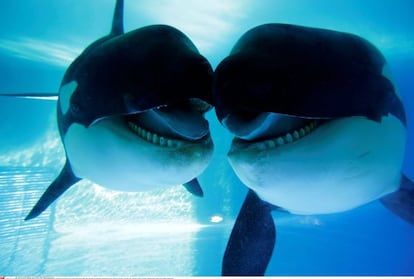Will Spain free its orca whales?
Pressure grows on marine parks to stop using the animals during shows


The music hasn’t been turned on yet, and the team is still readying for the show, carrying large buckets of sardines to the side of the huge pool in Loro Parque, a marine theme park in the Canary Island of Tenerife. Suddenly, three orca whales surface, their characteristic shrill call reminding everybody present that they are the main attraction. It’s also a moving illustration of the intelligence of these huge mammals, and their ability to connect with another species: our own. Long a source of fascination to humans, over the last half century orcas, or killer whales, have attracted millions of visitors to the marine parks around the world where they are held in captivity.
But water parks such as Loro Parque are under growing pressure from animal rights groups and a shift in public opinion, which is turning against the practice of keeping these giants of the ocean (males can weigh up to six tons and measure nine meters) in what are, in effect, large swimming pools.
The documentary ‘Black Fish’ has done much to raise awareness around the world about the use of orcas
There are around 50 orcas still held in zoos and marine parks, where they are used for shows to entertain the public. Only 12 are in the European Union, and six of them are in Puerto de la Cruz. Another six are in Marineland in the French resort of Antibes. Both parks are owned by Spanish company Parques Reunidos. According to the Whale and Dolphin Conservation (WDC) organization, 46 orcas, 35 of them born in captivity, are used in shows in Argentina, Canada, France, Spain, the United States and Japan. WDC says that there are 11 orcas in China and Russia, which have been captured since 2012.
The 2013 documentary Black Fish has done much to raise awareness around the world about the trade in, and use of, orcas. Recently the Canadian state of Ontario announced a ban on the sale and purchase of the mammals. A social networking campaign has forced Virgin to announce it will no longer organize tours to parks that capture orcas. Loro Parque has been under pressure to release Morgan, a female who was close to death and was rescued in 2010 in Dutch waters. After a lengthy legal battle, she was taken to Loro Parque because she would not be able to survive alone in the wild.
The economic crisis doesn’t seem to have affected business at Loro Parque, where Morgan now participates in shows. Tickets cost €34, and even outside the holiday season, the park – which is also home to parrots, gorillas, jaguars and dolphins – is filled with visitors. But the six orcas are Loro Parque’s star attraction, performing a 20-minute show, during which time their trainers remain out of the water.
We welcome a million visitors a year, and for a lot of people, this is their only contact with nature in an increasingly urban world” Javier Almunia, head of orca research at Loro Parque
Javier Almunia, head of orca research at Loro Parque, says that the shows are just part of the work carried out with the animals. “It is a way to see a living thing close up. We welcome around one million visitors a year, and for a lot of people, this is their only contact with nature in an increasingly urban world,” he adds. A spokesman for Parques Reunidos, which has a turnover of €540 million and runs 56 private zoos in 12 countries, says: “Our exhibitions and meetings with animals are a powerful and effective way of reaching people and teaching them how to look after our planet.”
Mexican biologist Fernando Ugarte has been working for almost a decade in Greenland as head of the marine mammals department of the Danish territory’s Natural Resources Institute. Ugarte took part in the release into the wild of Keiko, the orca made famous by the movie Free Willy, and so far the only member of the species to be returned to the wild. Fourteen years after Keiko was released back to the sea – he died two years later from pneumonia and failed to find a pod, constantly searching out human contact – awareness among the public about orcas has greatly increased.
“In my capacity as a scientist, I cannot say whether it is moral or immoral to keep orcas in captivity, because there are arguments on both sides,” says Ugarte by telephone from Greenland’s capital, Nuuk. “It has been shown that orcas live shorter lives in captivity. Their dorsal fins become flaccid because they don’t develop their muscles. They are intelligent animals, with an intensive social life, and spend their lives with their pod, or group. They are also very big. So they’re not a good candidate for captivity.”
Sea World’s profits plunged from $120.7 million to $87.2 million last year, with a five-percent fall in visitor numbers to its three sites in the Unites States
Kees Camphuysen, a biologist at the Netherlands’ Institute for Marine Investigation, is a convinced opponent of keeping orcas in captivity. “There are no arguments that justify keeping marine mammals in captivity in an age when it is now possible to see animals in the wild at a relatively low cost, for example, in the Canary Islands.”
Pedro Pozas Terrados, head of the Spanish division of the Great Ape Project – which aims to confer basic legal rights on chimpanzees, bonobos, gorillas, and orangutans – and a campaigner for an end to keeping orcas in captivity, says that awareness is increasing about the issue, “although much remains to be done.”
The impact on the public of Black Fish, which looked at the death of two keepers in Orlando and Tenerife in attacks attributed to the stress orcas suffer in captivity, has hit SeaWorld, the biggest player in the marine parks sector. Its profits plunged from $120.7 million to $87.2 million last year, with a five-percent fall in visitor numbers to its three sites in the Unites States.
“There has been a profound change in society’s perception of what is acceptable and what is not. And keeping these animals in captivity is not acceptable. The change is underway and SeaWorld and Loro Parque will have to change their business or disappear,” says Ingrid Visser, head of the Orca Research Trust, which campaigns against keeping orcas in captivity.
Tu suscripción se está usando en otro dispositivo
¿Quieres añadir otro usuario a tu suscripción?
Si continúas leyendo en este dispositivo, no se podrá leer en el otro.
FlechaTu suscripción se está usando en otro dispositivo y solo puedes acceder a EL PAÍS desde un dispositivo a la vez.
Si quieres compartir tu cuenta, cambia tu suscripción a la modalidad Premium, así podrás añadir otro usuario. Cada uno accederá con su propia cuenta de email, lo que os permitirá personalizar vuestra experiencia en EL PAÍS.
¿Tienes una suscripción de empresa? Accede aquí para contratar más cuentas.
En el caso de no saber quién está usando tu cuenta, te recomendamos cambiar tu contraseña aquí.
Si decides continuar compartiendo tu cuenta, este mensaje se mostrará en tu dispositivo y en el de la otra persona que está usando tu cuenta de forma indefinida, afectando a tu experiencia de lectura. Puedes consultar aquí los términos y condiciones de la suscripción digital.








































